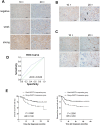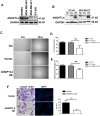ANGPTL4 overexpression inhibits tumor cell adhesion and migration and predicts favorable prognosis of triple-negative breast cancer
- PMID: 32928141
- PMCID: PMC7489026
- DOI: 10.1186/s12885-020-07343-w
ANGPTL4 overexpression inhibits tumor cell adhesion and migration and predicts favorable prognosis of triple-negative breast cancer
Abstract
Background: Triple-negative breast cancer (TNBC) patients have relatively poor clinical outcomes. A marker predicting the prognosis of patients with TNBC could help guide treatment. Extensive evidence demonstrates that angiopoietin-like 4 (ANGPTL4) is involved in the regulation of cancer growth, metastasis and angiogenesis. Therefore, its role in TNBC is of interest.
Methods: We tested the ANGPTL4 expression level in tumor tissues by immunohistochemistry (IHC) and detected its association with the clinical features of TNBC patients. Next, the effects and mechanisms of ANGPTL4 on TNBC cell migration and adhesion were investigated.
Results: We found that ANGPTL4 overexpression was associated with favorable outcomes in TNBC patients. ANGPTL4 upregulation inhibited cell adhesion, migration and invasion in vitro. Further analyses demonstrated that the possible mechanism might involve suppression of TNBC progression by interacting with extracellular matrix-related genes.
Conclusions: The present findings demonstrated that enhancement of ANGPTL4 expression might inversely correlate with TNBC progression. ANGPTL4 is a promising marker of TNBC and should be evaluated in further studies.
Trial registration: Retrospectively registered.
Keywords: ANGPTL4; Adhesion; Migration; Prognosis; Triple negative breast Cancer.
Conflict of interest statement
The authors report no conflict of interest.
Figures



Similar articles
-
Emerging roles of angiopoietin‑like 4 in human tumors (Review).Int J Oncol. 2025 Feb;66(2):9. doi: 10.3892/ijo.2024.5715. Epub 2024 Dec 20. Int J Oncol. 2025. PMID: 39704206 Free PMC article. Review.
-
USP2 promotes cell migration and invasion in triple negative breast cancer cell lines.Tumour Biol. 2015 Jul;36(7):5415-23. doi: 10.1007/s13277-015-3207-7. Epub 2015 Feb 17. Tumour Biol. 2015. PMID: 25687182
-
Oncometabolite D-2HG drives tumor metastasis and protumoral macrophage polarization by targeting FTO/m6A/ANGPTL4/integrin axis in triple-negative breast cancer.J Exp Clin Cancer Res. 2025 Feb 6;44(1):41. doi: 10.1186/s13046-025-03282-1. J Exp Clin Cancer Res. 2025. PMID: 39910592 Free PMC article.
-
MEK-dependent IL-8 induction regulates the invasiveness of triple-negative breast cancer cells.Tumour Biol. 2016 Apr;37(4):4991-9. doi: 10.1007/s13277-015-4345-7. Epub 2015 Nov 4. Tumour Biol. 2016. PMID: 26537583
-
Artificial intelligence: opportunities and challenges in the clinical applications of triple-negative breast cancer.Br J Cancer. 2023 Jun;128(12):2141-2149. doi: 10.1038/s41416-023-02215-z. Epub 2023 Mar 4. Br J Cancer. 2023. PMID: 36871044 Free PMC article. Review.
Cited by
-
The Personalized Inherited Signature Predisposing to Non-Small-Cell Lung Cancer in Non-Smokers.Cancers (Basel). 2024 Aug 20;16(16):2887. doi: 10.3390/cancers16162887. Cancers (Basel). 2024. PMID: 39199663 Free PMC article.
-
Changes in Pulmonary Microenvironment Aids Lung Metastasis of Breast Cancer.Front Oncol. 2022 May 26;12:860932. doi: 10.3389/fonc.2022.860932. eCollection 2022. Front Oncol. 2022. PMID: 35719975 Free PMC article. Review.
-
Emerging roles of angiopoietin‑like 4 in human tumors (Review).Int J Oncol. 2025 Feb;66(2):9. doi: 10.3892/ijo.2024.5715. Epub 2024 Dec 20. Int J Oncol. 2025. PMID: 39704206 Free PMC article. Review.
-
The role of ANGPTL4 in cancer: A meta-analysis of observational studies and multi-omics investigation.PLoS One. 2025 Apr 15;20(4):e0320343. doi: 10.1371/journal.pone.0320343. eCollection 2025. PLoS One. 2025. PMID: 40233044 Free PMC article.
-
Angiopoietin-like 4 promotes glucose metabolism by regulating glucose transporter expression in colorectal cancer.J Cancer Res Clin Oncol. 2022 Jun;148(6):1351-1361. doi: 10.1007/s00432-022-03960-z. Epub 2022 Feb 23. J Cancer Res Clin Oncol. 2022. PMID: 35195748 Free PMC article.
References
MeSH terms
Substances
LinkOut - more resources
Full Text Sources

